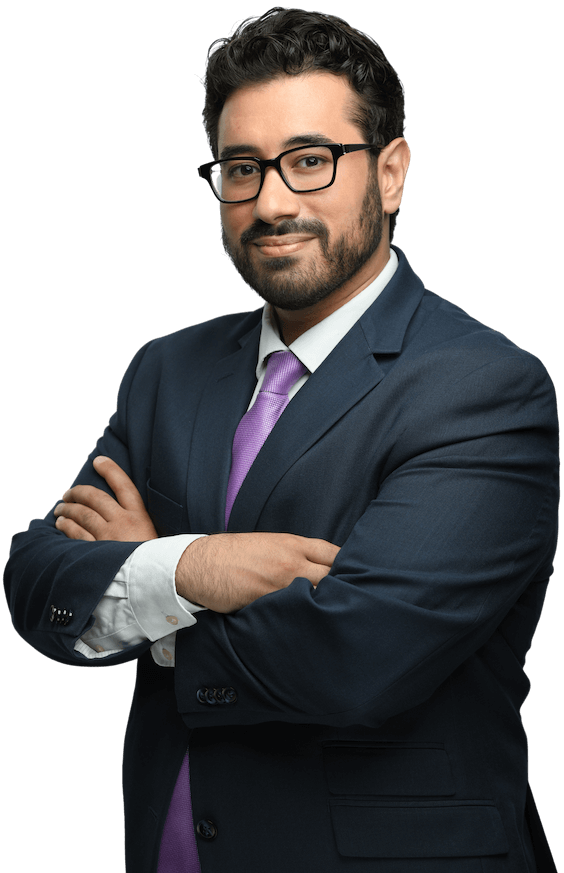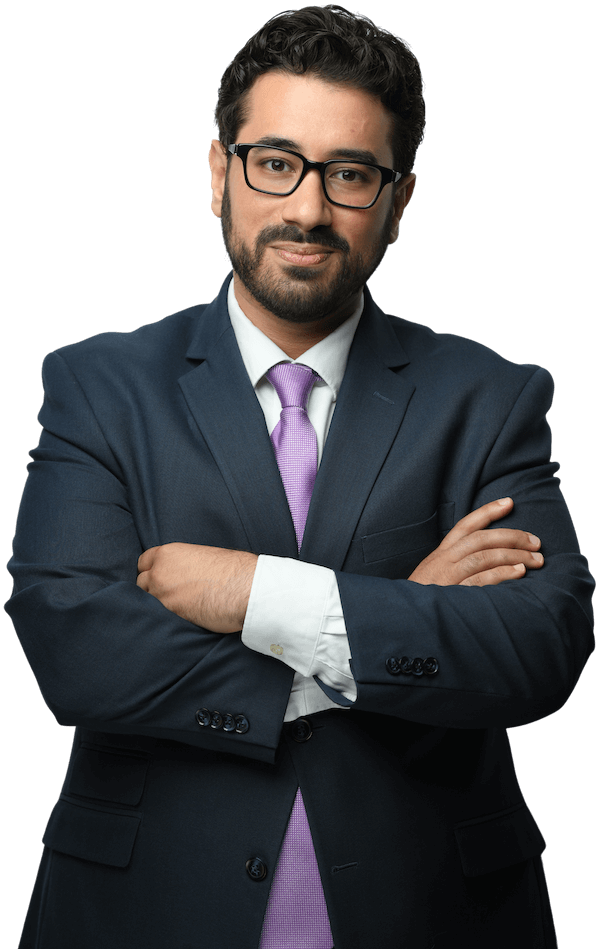Attorney Mehdi Essmidi was a life saver. I was in a very horrible situation, where I reached out to Mehdi on a Sunday, and was able to speak with him regarding my issues. Rather than wait until the following Monday, we set a time to meet & speak so take action in regards to my issues. Fast forward, my case was later dismissed - and my I was able to resume my daily life. Cheers to Mehdi.

NYC Healthcare Fraud Defense Attorney
Call us now or schedule a free consultation, and Attorney Mehdi Essmidi will contact you personally to discuss your case.

Get an Experienced Former Prosecutor on Your Side
Federal and state healthcare laws can be challenging to understand, and the legal system alone can feel like an uphill battle. You’re in the right place if you’re a medical professional or healthcare provider concerned about your career, reputation, and freedom.
At the Law Offices of Mehdi Essmidi, we understand healthcare fraud cases and the high stakes involved. As a former New York City prosecutor and healthcare fraud attorney, Mehdi Essmidi knows how these cases are built and how the prosecution investigates your case. Call us for a free consultation.
Healthcare Fraud
Federal health insurance programs such as Medicare and Medicaid provide health insurance coverage to qualified individuals. Healthcare fraud involves submitting false claims to Medicare, Medicaid, or private insurance companies for financial gain.
It’s a complicated area of the law that can include many activities, from billing for services not rendered to upcoding charges. In New York, healthcare fraud is prosecuted under state and federal laws:
New York Penal Law § 177.00
New York State Penal Law § 177.00 prohibits individuals or entities from providing false information or omitting material facts in claims for health insurance payments. The severity of the offense is determined by the amount of money obtained by fraud over a one-year period. Penalties can vary from a class A misdemeanor to a class B felony for amounts exceeding $1 million.
False Claims Act (31 U.S.C. §§ 3729-3733)
The Federal False Claims Act (FCA) is a federal law that places liability on individuals and companies who submit false claims to the government or cause such claims to be submitted, including Medicare and Medicaid.
18 U.S. Code § 1347
18 U.S. Code § 1347 is a federal statute that criminalizes healthcare fraud and any attempt to execute a scheme to defraud a healthcare program or to collect money or property from a healthcare benefit program by false or fraudulent pretenses. It applies to public programs like Medicare and Medicaid, as well as private insurance plans.
Physician Self-Referral Law (Stark Law)
The Physician Self-Referral Law is a federal statute prohibiting physicians from referring Medicare or Medicaid patients to entities providing designated health services (DHS) if the physician or a close family member has a financial relationship with that entity. If you are under investigation for Medicare fraud, hiring a New York fraud attorney can make all the difference in your case.
Types of Healthcare Fraud Cases We Handle
Our experienced healthcare fraud attorneys are dedicated to defending individuals accused of defrauding healthcare benefit programs, ensuring they receive legal representation against charges of Medicaid and Medicare fraud.
Medicare Fraud
Medicare fraud happens when people submit fraudulent claims to the federal Medicare program. This can refer to billing for services not provided, upcoding charges, or providing unnecessary treatments. The investigations involve state and federal agencies, and having a former prosecutor like attorney Mehdi Essmidi can improve your chances of a favorable outcome.
Medicaid Fraud
A Medicaid fraud investigation can include falsifying patient eligibility, billing for phantom services, or engaging in kickback schemes. Mehdi Essmidi, a Medicaid fraud lawyer, has a successful track record fighting federal prosecutors in New York City.
Pharmacy Fraud
Pharmacy fraud can include billing for prescriptions never filled, switching prescribed drugs for cheaper alternatives, or participating in prescription drug diversion schemes. We have experience handling government program allegations and fraud cases.
Common Healthcare Fraud Defenses
The potential consequences of Medicaid and Medicare fraud include civil penalties, financial restitution, and even jail time. Some possible defenses we may use:
Lack of intent: Showing that any billing errors were unintentional mistakes rather than intentional fraud.
Challenging the evidence: Examining the prosecution’s evidence for contradictions or violations of your rights during the investigation.
Statute of limitations: The alleged fraudulent activity occurred outside the statute of limitations.
Every case is different, and the best defense depends on the facts of your case. At the Law Offices of Mehdi Essmidi, we carefully review your case and prepare a customized defense strategy to protect you and your future.
Examples of Healthcare Fraud
Healthcare fraud laws in New York categorize the offense into various degrees based on the amount defrauded and the severity of the crime. Here are some examples that can lead to healthcare fraud charges:
Phantom Billing: Billing for services not provided.
Upcoding: Billing for a more expensive procedure or service than what was actually provided.
Unbundling: Billing separately for procedures that are typically charged as a package.
Kickbacks: Receiving payment for patient referrals.
Unnecessary Services: Performing and billing for medical services that are not medically necessary.
Falsifying Diagnoses: Changing a patient’s diagnosis to justify unnecessary tests, surgeries, or other procedures.
Drug Diversion: Healthcare providers getting prescription drugs for personal use or illegal distribution.
Double Billing: Billing more than once for the same service, either to the same payer or to multiple payers.
Misrepresenting Non-Covered Treatments: Billing for services not covered by Medicare or Medicaid as if they were covered procedures.
Conviction Consequences
A healthcare fraud conviction can include fines, imprisonment, loss of professional licenses, and removal from federal healthcare programs. That’s why you need an experienced NYC healthcare fraud lawyer. Here are some of the consequences you may face:
Criminal Penalties: Based on the severity of the fraud, you could face significant fines and imprisonment. Federal healthcare fraud convictions can carry up to 10 years in prison per count and up to 20 years if a serious bodily injury takes place.
Financial Penalties: Fines for healthcare fraud can be substantial. You could be required to pay up to $250,000 for individuals or $500,000 for organizations per count. You may also be ordered to pay restitution.
Loss of Professional License: A conviction could result in the suspension or complete revocation of your medical license.
Exclusion from Federal Healthcare Programs: You may be barred from participating in Medicare, Medicaid, and other federal healthcare programs, which can limit your ability to practice.
Asset Forfeiture: The government may seize assets obtained through fraudulent activities.
Other Fraud Cases We Defend
Contact Us Today for a Free Consultation
Whether you are dealing with Medicaid fraud, Stark Law violations, Medicare fraud allegations, or any other fraudulent scheme charges, don’t wait to get the legal help you need. NYC healthcare fraud defense attorney Mehdi Essmidi has the experience your need in health care fraud investigations and the high stakes involved in federal charges. Contact us for a free consultation today.
Frequently Asked Questions
How does the Anti-Kickback Statute relate to healthcare fraud?
The Anti-Kickback Statute is a federal law that prohibits the exchange of any form of remuneration to induce or reward referrals for reimbursable services by federal healthcare programs like Medicare or Medicaid. Violations of the Anti-Kickback Statute can lead to fines, imprisonment, and removal from federal healthcare programs. It can also result in additional charges under other federal statutes, such as the False Claims Act, if the kickbacks lead to fraudulent claims being submitted to federal programs.
What is the difference between health insurance fraud and Medicaid fraud?
While both fall under the umbrella of healthcare fraud, health insurance fraud typically involves private health insurance companies, whereas Medicaid fraud involves misrepresentation in claims submitted to state-administered federal programs. Both can lead to criminal investigation and require a strong defense strategy, especially if the alleged conduct includes referring patients for unnecessary medical services.
What should I do if I’m under a federal investigation for healthcare fraud?
If you are facing a federal investigation for healthcare fraud, speak with an experienced NYC healthcare fraud defense attorney as soon as possible. Federal agencies may already be building a case. Early legal representation can help you through interactions with the federal government and avoid mistakes that could lead to criminal prosecution.
How does the federal False Claims Act work in fraud cases?
The federal False Claims Act allows the government to pursue civil penalties against individuals or entities that knowingly submit fraudulent claims to federal healthcare programs, such as Medicare. False Claims Act violations can result in fines, civil liability, and even criminal charges. Healthcare providers accused of false claims should consult healthcare fraud attorneys as soon as possible.
Can a medical provider be charged for offering unnecessary services?
Yes. Providing medically unnecessary services can lead to healthcare fraud charges, especially if these services are billed to a health insurance company or federal programs like Medicaid or Medicare. Authorities may interpret such conduct as an attempt to commit fraud, which could trigger both civil and criminal liability under health care fraud laws.
How are healthcare fraud cases investigated?
Healthcare fraud investigations are often initiated by federal agencies such as the Department of Health and Human Services, the DEA, and the FBI, and may involve audits of medical records and interviews with healthcare providers. If fraudulent billing, phantom billing, or prescription fraud is suspected, prosecutors may pursue charges under statutes like the False Claims Act or the Anti-Kickback Statute.
Schedule a Free Consultation

Experienced Criminal Defense Attorney
As a former New York City Prosecutor, Attorney Mehdi Essmidi knows the playbook that the prosecution will use against you. He uses his experience and knowledge to aggressively fight your charges and get you the best possible outcome. If you're looking for an aggressive defense lawyer who won't back down from a challenge, then Attorney Essmidi is the right choice for you.